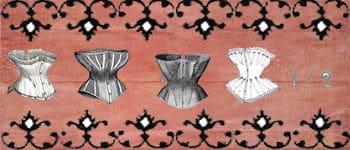Vanity Fair is arguably the crowning achievement of British author William Makepeace Thackeray. In it, he created perhaps the greatest anti-heroine in English literature, Becky Sharp. The name of the novel is an allusion to a place found in Pilgrim’s Progress where travelers find themselves lured in by a fascination of material things. It can also read as a satire on English society of that time. Thackeray’s masterpiece has been adapted for both the big and small screen many times. But despite having seen two film versions, it is ITV’s recent adaptation which finally introduced me to the brilliance of Vanity Fair.
SYNOPSIS
Vanity Fair follows the journey of two young ladies from their friendship at school, through a decade of their lives.
Becky Sharp and Amelia Sedley cannot be more different. Becky is orphaned and without fortune but uses her education, charm, and beauty to make the most of her paltry connections. Above all, she desires financial security and the influence of social position.
Becky has no conscience about how she achieves these things. In her ruthless betterment of self, Becky manipulates various members of the Crawley family, Amelia’s brother Jos, and the Marquis de Steyne. Though she eventually obtains her objectives, it comes at a higher price than she expects.
Related: Gone with the Wind (1939) – The Beloved Romantic Southern Epic
By contrast, Amelia is sweet-natured but passive and completely naïve to the true natures of those she loves best. Unlike Becky, her only real wish is to settle down with her fiancé George Osborn to a life of happy domesticity. William Dobbin, an army captain and friend to George, secretly assists her in gaining her heart’s desire. Like Becky, Amelia eventually realizes her dream, but it also comes at a high cost.
As these women navigate ambition, romance, war and disappointment they must eventually face the truth and consequences of their choices. They must also decide if they are willing to change.
REVIEW
Viewings of two previous Vanity Fair film adaptations left me with unfavorable impressions. But apparently, the third time really is the charm, because I absolutely loved ITV’s interpretation of Thackeray’s famous novel.
Part of this is the absolutely stunning presentation of the story. From the settings to the costumes, to the cinematography, to the music score, everything works together to not only ground but to enhance the world of Vanity Fair. There’s some particularly gorgeous camera work with natural light, which is always a pleasure for me. I also loved the detailed, gorgeous dresses (and accessories) worn by the women, particularly Becky Sharp. My personal favorite is a stunning red dress Becky wears in a moment of triumph. And unlike with other productions, the men’s suits and uniforms do not suffer by comparison to the ladies.
Related: Vintage Literature Review – I Capture the Castle
Another aspect which certainly serves this production is that it is told in a six-part series rather than in a two-hour film. This allows more time to develop various story lines and characterizations. In turn, it provides a deeper understanding of the historical setting as well as the personalities and motivations of the characters. I feel this is absolutely essential in a tale whose bookish subtitle is “A Story Without a Hero.” Because no one wants to watch hours of people making stupid or selfish decisions.
CAST AND CHARACTERS
Honestly, I attribute most of the success of this adaptation to the excellent casting. The mix of newer faces in the main roles with more familiar ones in supporting parts is a gamble that pays off. It’s fun seeing British stalwarts like Anthony Head, Peter Wight, Frances de la Tour, and Felicity Montagu make appearances in minor parts. I especially enjoyed seeing Martin Clunes play against type as the vulgar Sir Pitt Crawley. These mature actors create a solid foundation for the younger actors to build on, which indeed they do.
The younger, less experienced actors playing the main leads absolutely inhabit their characters and bring the story of Vanity Fair to life. Tom Bateman perfectly depicts the dashing gambler Rawdon Crawley who truly loves his wife. He understands her character but does not condemn her for it, even when it leads to his ruination. Charlie Rowe captures the charming but spoiled George Osborne who remains the object of Amelia’s affections.
For her part, Claudia Jessey as Amelia Sedley took me through a gamut of emotions. I began by respecting her goodness but eventually found myself disgusted by her deliberate ignorance of George’s character and other truths. I also found myself frustrated by her complete passiveness along with her habit of allowing others to care for her and make decisions regarding her life. Not to mention, she treated William Dobbin with a total lack of regard.
Speaking of Dobbin, Johnny Flynn’s portrayal of George’s friend and Amelia’s admirer is a revelation. If there is a hero in Vanity Fair, it’s Dobbin. Secretly in love with Amelia, he quietly advocates for her. He always seeks to support her and improve her life. He does so with absolutely no expectation of her love or acknowledgment. His Dobbin is perhaps the most self-sacrificing character I’ve seen in a long time.
RELATED: 19 Quiet Underrated Romantic Heroes in Film and Television
But it’s Olivia Cooke who is the lynchpin in this whole production. She IS Becky Sharp. Cooke captures the perfect blend of Becky’s blind, selfish ambition with the charm that keeps her from being completely unlikeable. This adaptation provides a bit more detail on Becky’s background. It helped me feel some compassion for her even as she ruthlessly pursues wealth and security. I understood why she would do so even if I didn’t agree with the destruction left in her wake.
In many ways, Becky and Amelia provide the perfect contrast of a woman’s place in society during this time. While Becky refuses to allow her circumstances to dictate her life, Amelia chooses the opposite. Amelia’s portrayal is as a selfless character. In the end, however, her choice to meekly accept her fate proves just as harmful to the men in her life as it does to those in Becky’s. Thackeray may have intended Becky Sharp to serve as a cautionary moral tale, but Amelia Sedley’s story arc also serves that purpose in a way as well.
OVERALL RECOMMENDATION
Whether you’ve been disappointed with past adaptations or you’ve never seen Vanity Fair before, I encourage you to watch this version. It’s a stunning production. I also believe it follows the novel somewhat more closely than previous films. I commend ITV for doing an excellent job of bringing Vanity Fair to life. They’ve made Thackeray’s “Story Without a Hero” compelling and entertaining.
Where to Watch: Vanity Fair is streaming on Amazon Prime
Content: This series is rated TV-14. There is some mild war violence, a few profanities. Physical intimacy is implied, rather than shown.
Photo Credit: ITV and Amazon Studios
Have you seen any of the Vanity Fair adaptations? Which is your favorite? What do you think of this version?
Featured image credit: Vanity Fair – ITV/Amazon Studios
OVERALL RATING

“You had me at hello.”
ROMANCE RATING

“In vain have I struggled. It will not do. My
feelings will not be repressed. You must allow me
to tell you how ardently I admire and love you.”
ARE YOU A ROMANCE FAN? FOLLOW THE SILVER PETTICOAT REVIEW:
 Our romance-themed entertainment site is on a mission to help you find the best period dramas, romance movies, TV shows, and books. Other topics include Jane Austen, Classic Hollywood, TV Couples, Fairy Tales, Romantic Living, Romanticism, and more. We’re damsels not in distress fighting for the all-new optimistic Romantic Revolution. Join us and subscribe. For more information, see our About, Old-Fashioned Romance 101, Modern Romanticism 101, and Romantic Living 101.
Our romance-themed entertainment site is on a mission to help you find the best period dramas, romance movies, TV shows, and books. Other topics include Jane Austen, Classic Hollywood, TV Couples, Fairy Tales, Romantic Living, Romanticism, and more. We’re damsels not in distress fighting for the all-new optimistic Romantic Revolution. Join us and subscribe. For more information, see our About, Old-Fashioned Romance 101, Modern Romanticism 101, and Romantic Living 101.

I’ve always been a fan of BBC’s 1998 version of Vanity Fair. Given how I felt about ITV’s version of War and Peace I’m a bit iffy about this production.
I keep hearing amazing things about the 1998 version of Vanity Fair, which means I probably need to watch it. It sounds like this newest adaptation isn’t as well-liked as that one. My only other experience with Vanity Fair were two films which I didn’t like at all, so compared to them, I really enjoyed ITV’s production.
I really loved this version – especially the casting of Becky – I’ve not seen the old bbc series though. I like the sound of Phillip Glennister as Dobbin, but otherwise I think the new one would be tough to beat!
I loved Dobbin in this one! He was my favorite character.
I have seen the 1935, 1967, 1987, 1998, 2004 and the latest version of “VANITY FAIR”. I enjoyed all of them . . . with the exception of the 1935 movie with Miriam Hopkins. I thought that was awful. However, I believe the BEST adaptation of Thackery’s novel is the 1987 miniseries with Eve Matheson as Becky Sharp.
I have been wanting to watch that one! Thanks for the recommendation. 🙂
No! It was so awful! The characters were nothing like the book! I thought Becky was the worst, with no feel for the character that Thackeray created. Dobbin was okay, but too polished and pretty and not awkward enough. It also didn’t really give you a sense of how his decisions made things worse for everyone, which you get in the book. Amelia was played pretty well though, and with her you do get some of the layers that Thackeray had in his story. We were so disappointed with this adaptation though. My husband (who also loved the book) couldn’t finish it, but I thought maybe it would get better… The 1998 version was mostly better, although it has its own issues.